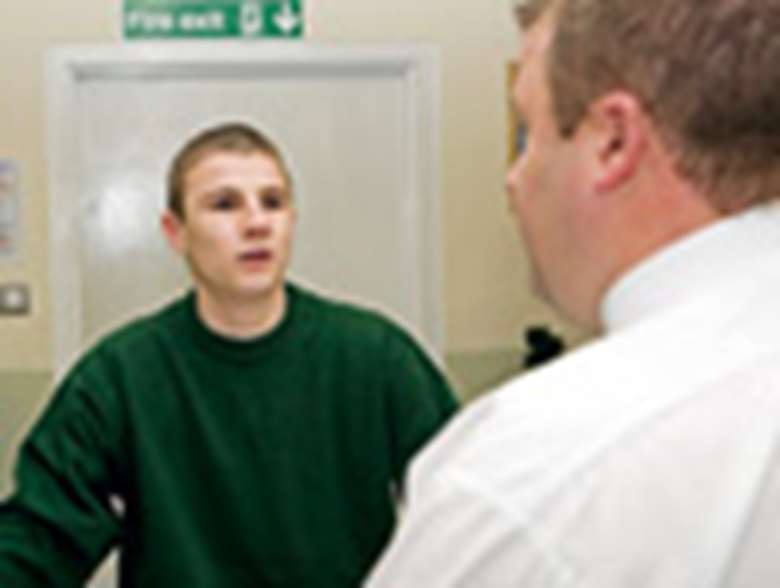Third of prison officers lack safeguarding training
Neil Puffett
Monday, January 24, 2011
Nearly one in three prison officers working with vulnerable young offenders in custody have not completed training on safeguarding and assessing vulnerability, an investigation by CYP Now has found.

Campaigners have labelled the findings as "woeful" and "worrying", particularly at a time when safeguarding in youth prisons is high on the agenda with the second inquest under way into the suicide of 14-year-old Adam Rickwood at Hassockfield secure training centre. The Prisons and Probation Ombudsman is also examining the death of 18-year-old Michael Cartwright at Stoke Heath YOI last month.
The figures, provided by the Youth Justice Board (YJB) following a Freedom of Information request, show that 503 out of 1,747 staff (29 per cent) in state-run young offender institutions (YOIs) are yet to pass mandatory training courses. Figures are not available for the two privately run establishments - Ashfield YOI, run by Serco, and Parc YOI, run by G4S.
Specialist training for officers in YOIs, overseen by the YJB, is split into two phases (see table and box). The first phase of the Juvenile Awareness Staff Programme (JASP 1) includes a day-long session on child protection. The second (JASP 2) can only be attended on completion of the first phase and includes modules on mental health, vulnerability assessments, managing difficult behaviour, training and resettlement. In total, the training takes seven days to complete.
According to the figures, 80 per cent of prison officers have passed phase one and 71 per cent have passed both phases. Levels vary across the secure estate with the best performer being Newhall YOI, where all 49 staff have completed both phases.
This contrasts with Warren Hill YOI, where just 56 per cent of the 222 staff have completed the full programme.
Campaigners are now calling for training to be completed before officers begin working with children. Penelope Gibbs, director of the Prison Reform Trust's campaign to reduce child imprisonment, said: "The lack of training is woeful. Nobody should start in a YOI without social work training or the whole of JASP 1."
Tim Bateman, criminologist at the University of Bedfordshire, described the current training situation as "deeply worrying". "There needs to be some kind of link between training and day-to-day procedure," he said. "One thing that makes that difficult is the simple problem of staff-to-inmate ratios in YOIs. Numbers of staff on duty at any one time, in comparison to secure training centres or secure children's homes, means inevitably there will be a gap between what the training says and what there is a capacity to do. I suspect there is an issue that goes beyond just the training itself."
YJB chief executive John Drew said a YJB corporate target was in place between 2003 and 2006 that aimed for 80 per cent of staff in the youth justice system to be helped to gain the Professional Certificate in Effective Practice (Youth Justice) or an equivalent, which was achieved.
"Since 2006 there has been no target, and responsibility for JASP completion now belongs to the National Offender Management Service (Noms). The YJB works closely with Noms to support it in the delivery of this target," he said.
The YJB has also revealed it does not know how many prison staff are trained in life-saving resuscitation skills. The issue came under the spotlight last month after CYP Now detailed concerns raised by the Prisons and Probation Ombudsman about a lack of resuscitation training for staff at Lancaster Farms YOI. The establishment was criticised over the case of 15-year-old Liam McManus, who took his life there in November 2007. It emerged that some officers at the YOI had not received resuscitation training and attempts to resuscitate Liam were not made for more than three minutes after he was found, despite his body still being warm.
TRAINING REQUIREMENTS
Specialist training for officers in young offender institutions, overseen by the Youth Justice Board, is split into two phases - Juvenile Awareness Staff Programmes one and two. The second phase (JASP 2) can only be attended on completion of the first phase.
JASP phase 1
- One day child protection
- Two days training delivered by Trust for the Study of Adolescence
JASP phase 2
- Half-day mental health
- Half-day substance misuse
- One day vulnerability assessment
- One day resettlement and training
- Half-day managing difficult behaviour
- Half-day safeguarding
EXPERT VIEW
Sue Berelowitz, deputy children's commissioner for England
These statistics are dismaying but unfortunately I am not surprised by them.
Of course, there will be different training for staff in secure training centres and we have heard from the second inquest into the death of Adam Rickwood that staff were not aware that certain restraint techniques were unlawful.
Young people who get into trouble with the law and end up in custody are some of the most vulnerable children in the country.
High proportions have mental health needs and 45 per cent have come out of the care system. We are talking about an extremely vulnerable population with needs that are very different to the adult prison population.
In some establishments, staff are placed there from adult prisons, not by choice but on a rotation system, and I have met staff who have said they would rather not be there. It is absolutely critical they understand the needs of children in general and issues around their development.
It should be an absolute priority that everybody is trained, ideally before they come in, and have some qualification relating to children and adolescents.
Nobody should move from an adult prison to a children's prison without making a positive choice to work with children.
We absolutely want to have a distinct unit [for youth justice] within the MoJ.
My concern about the National Offender Managment Service (NOMS) is it almost exclusively focuses on the adult estate, they don't understand the needs of children.
It is absolutely essential they don't take over responsibility for the juvenile secure estate.






